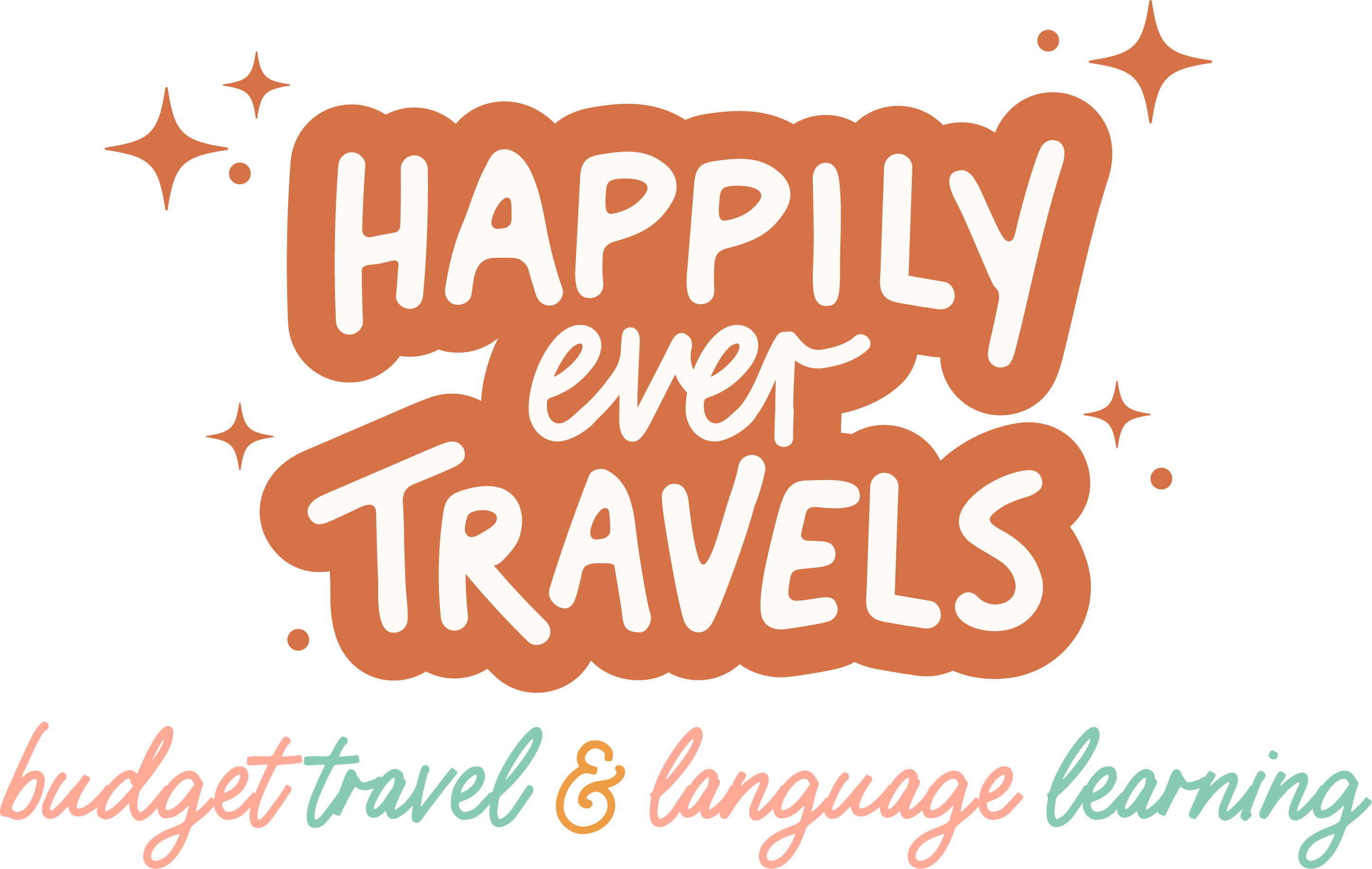Thinking about heading abroad to find a job? There are plenty of things you should know before living abroad, but working abroad is another beast altogether. In this post, I interviewed Vanessa M.W. from Wander Onwards to get her take on the advantages and disadvantages of working abroad.
After working abroad for 8 years for some big-name companies in 3 different countries, she is super qualified to tell us what to know before making the leap.
Even though I have worked abroad through VIPKid and my blog, I’ve never actually worked for a company abroad. Vanessa’s answers will cover the pros and cons of working abroad with a 9-5 official job, and I’ll add a bit from my perspective as a digital nomad working for myself.
A little more background on Vanessa and her blog Wander Onwards: Vanessa M.W. is from L.A. and started her career abroad by moving to China on her own in 2013. She started as an English teacher but then moved on to be a freelancer for Chinese companies while also starting her blog.

After that, she moved to the U.K. to get her Master’s (in a field very different than the one she ended up working in!), and then after realizing she didn’t love the career she had chosen, she moved on to work for a well-known travel agency in tech with no previous experience.
Even with no previous experience, she was able to teach herself through YouTube and online sources the skills she needed to get her job. Using that same job, she was able to transfer to Germany and continue her career abroad in another country.
After the Pros and Cons of Working Abroad list, I’ll include some of the awesome tips Vanessa has for actually getting a job abroad and how to stand out on your resume.
9 Advantages of Working Abroad / Pros of Working Abroad
1. Community & Meeting New People
“I’m never going back to the United States. I have truly found my place in the world where the environment matches my values, and the people I surround myself with are incredible and from all over the world. You can’t choose where you’re born, but you can choose where you end up.”
Vanessa loves her work and life abroad, and the community she has built outside of the USA. If you are an avid traveler or nomad, you may find that when you head back to the US, you don’t fit in anymore.
The USA tends to focus more on spending money on things, not traveling as much, and not speaking as many languages as the rest of the world.
You may find that your true community is elsewhere, where travel and languages are valued and people understand why you put those things above possessions.
I’ve had people ask me why I learn languages since you can use Google Translate. If that’s a question you have, we probably wouldn’t be super great friends! lol
I find that most people I’ve met in Europe and Asia are well-traveled and plan to make that a part of their lives, which is important to me.
2. Daily Adventure Through New Experiences
“Every day is an adventure! If you wanna live life and feel everything, move abroad. I could die tomorrow and I could say “I did everything I wanted, I have no regrets.”

Like Vanessa said, I think if you want to work abroad or live abroad, then you should go for it. When you are in a foreign country, everything is more interesting, and even just going to the grocery store is an adventure.
You’re in a state of constantly learning, whether it’s a new food, a new tradition or cultural difference, or a new word in a new language.
If you’re looking to make life more enjoyable and more exciting than ever, then working abroad is definitely for you.
3. Get Foreign Language Skills Through Learning a New Language
Vanessa speaks German, Spanish, Chinese, and English and has plans to learn French.
The opportunity to learn these languages is just not as possible in America because there is no place to practice and education isn’t set up to support this. While in Europe, learning the local language is expected and most Europeans speak 2-3 languages.
Abroad, you can find low-cost language programs that help you get a visa and learn the language at the same time. Vanessa did this in Beijing at first so that after a year of studying Chinese, she knew enough to help her get a job in China.
You can do language programs for visas all over the world! I’m looking at Italy for a 1-year visa and the opportunity to study Italian for 20 hours a week for a WHOLE YEAR.
Guess how much that costs?
Only 6,000 euros for the classes. That comes out to just 5.70 euros per hour!
The best way to start learning a language, whether you’re abroad or haven’t left yet, is through italki classes.
I seriously would not be able to learn languages without italki. I take 3 classes per week right now (one for each language I’m learning). Try out a class and you’ll thank me later! They’re usually $9 or less!
4. Stand out on Job Applications Because of International Experience (More Job Opportunities)
When finding her latest job abroad, Vanessa applied for 20 jobs, got 15 callbacks, and made it to 8 final rounds. She thinks this was made possible because her experiences abroad have made her stand out more on job applications.
She’s worked for companies in multiple different countries and learned the languages while there, and she also has a blog that showcases her tech abilities.
5. Learn to Do Anything
Instead of going to school again to learn the skills she needed for her new career abroad, she turned to the Internet.
Tech is one of the best fields to get into if you’d like to find a job abroad or freelance, but it can feel too difficult to get into.
According to Vanessa, “You do not need to learn how to code in order to get a job in tech. There is a lot of fear around that.”
Instead, she suggests jobs like Account Management, where you don’t need to know how to do the specific techy things, but you need to be able to speak on them.
Or Product Management (what she currently does) which follows the customer journey and helps websites and apps to sell products and keep customers on the site for longer periods of time.
When she decided she wanted to get into the tech field, she taught herself everything through YouTube and specifically recommended the channel “The Product School.”
Pro Tip: Instead of buying their courses/boot camps, you can follow their online schedules for the Bootcamp and match the days with the Youtube video in order to replicate the Bootcamp for free!
6. Creating an Awesome Network Through International Work Experience
Your network will explode with friends and loved ones from all over the world (maybe even a few exes!)
Vanessa states that she has someone she cares about in every major port in the world, so if she’s going to Nigeria she has someone, in Hong Kong she has someone.

These connections help you feel a lot less alone, with so many people ready to help you, and you’re ready to help them!
She compared her apartment to a hostel, where people she’s met across the world are coming and staying with her throughout the year. She also knows that she can stay with any of them if she needs to!
Although you can definitely make friends and expand your network at work, Vanessa tries a different method: talking to strangers in the street or on Instagram.
She recently met a girl on Instagram and then went on a trip to Spain with her. When she’s back in her home city, she looks out for women who look close to her age and strikes up a conversation with them when she’s going to and from the grocery store.
While doing this, she actually was able to meet someone who graduated from the same college as her in America, who also had a German boyfriend, worked in the same field as Vanessa, and lived only a block away!
Through that girl, she was able to meet a bunch of other friends in the area and became part of their social group.
Of course, if you are in a different country, you will definitely need some language basics first before doing this. However, this is how I have met many of my friends abroad as well!
Like my friend Edison who we met in Indonesia, then later we met him in his home country of Singapore and he showed my husband and me around the city.
Or if I overhear people speaking in a language I know, I gather up the courage to talk to them for a bit. I’ve never once regretted doing that and it’s especially fun if you are in a country where that language isn’t spoken (like finding Spanish speakers in Italy or Italian speakers in Nepal, both of which I’ve done).
7. Get Outside Your Comfort Zone with a New Way of Life
There are always people out there worse than you doing really well in the world, so why can’t you do those things as well?
You may feel like you could never do the things mentioned in this post: learn a new language, meet friends abroad, work for an international company, get your Master’s degree in Europe, etc.
However, that’s just imposter syndrome! You are DEFINITELY capable of getting outside of your comfort zone and making your life and work abroad amazing.
The best part about living abroad and working abroad is that getting outside of your comfort zone is actually easier than it would be in your home country.
At home, you are tied down to who you believe you are, but when you leave, you can create the person you really want to be. I couldn’t have ever imagined striking up conversations with strangers, especially in other languages, but traveling and working abroad has made me the type of person who does those things.
As for Vanessa, she graduated college and bought a one-way ticket to Beijing all by herself to begin her life abroad. That may sound crazy, but you only need to get up the courage to do one thing at a time!
Push yourself to apply for that job, buy that ticket, and learn a language, one thing at a time.
8. More Holidays/ Days Off
Vanessa got 43 holidays this year at her job. The standard in Europe is 30 days per year!

Compared to America, which actually has no law requiring any time off at all, this is a HUGE plus to working abroad in Europe. Most Americans get 14 days off per year (my husband currently only gets 10 paid days off and bank holidays).
Not only do you get more days off, but you will actually be able to go somewhere with those days! Traveling around the USA is crazy expensive and to get to another country takes a ton of money and planning.
However, if you are already in Europe or Asia, you can travel all over the continent for usually under $100-$150. Accommodation and activities are all way cheaper, so you’ll be able to do more with your days off.
9. Safety While Working & Living Abroad
Many people may feel like the USA is one of the safest places to live, however, statistics show that that is not the case!
According to the Global Peace Index, the USA comes in at number 128 out of 163.
Your new country may be even safer than the US, or your home country. So don’t be afraid to jump into a new life and job abroad!
7 Disadvantages of Working Abroad / Cons of Working Abroad
10. Choose a Country/ Company that Aligns With Your Values
Vanessa has worked for a Chinese company, a British company, and an American company abroad. According to her, the values of each country truly are reflected in the company itself, for better and for worse.
In the Chinese company, she only got 7 days of holiday per year, but the environment felt like a family. While working there, they would provide lunches each day and she was always invited to parties celebrating Chinese holidays.
This helped her assimilate much more easily and quickly.
The British company was a bit more difficult. Vanessa stated, “The British are not direct at all. They do things in a roundabout way, which is very cultural. They don’t like being direct or talking about their feelings.”
At that company, she felt like she couldn’t work at the same speed and with the same directness as she was used to in the past.
Her personality as an American also “freaked out” her British coworkers who felt she was too loud and too American. Because of these differences, she left the company after only a year.
In the American company (which was still abroad), she felt most at home because almost every coworker was a foreigner as well. She has colleagues from all over Europe and outside Europe as well.
Since she is American, her values most matched the American company. Although she could work for other companies, this one matched her lifestyle the most.
11. Potentially Higher Taxes
One con of working abroad is that you may be taxed higher than what you were taxed in your home country. Take that into account when calculating the salary you will need and what your living expenses will be in your new country.
12. Work Visas & Stability (Bureaucracy!)
With the way that work visas are structured, you are at the mercy of the company that you work for to get your visa.

So if you quit, then they will cancel your visa and your entire life will be canceled abroad essentially.
When you’re transferring a work visa, your new company has accepted complete responsibility for you.
This means they are liable for you while you live in that country. So if you steal a car or commit any crimes, the company you work for is responsible for you since they are sponsoring your work visa.
This can be a really stressful situation to be in.
Imagine you just moved to a new country on a work visa and you hate your job, but you just moved across the world to do it. If you choose to leave, you lose everything in that country.
There isn’t much stability in a situation like this. What a lot of people do is find someone to marry from that country (which is what Vanessa did) but what else can you do to make sure you create some stability in your new country?
The next best thing is to aim for permanent residency, which means that you stayed in that country for a certain amount of time, filled out the necessary paperwork, and now have almost the same rights as a passport holder of that country.
The main difference is that you wouldn’t receive a new passport. Even if you are married to a citizen, it’s smart to figure out what the requirements are for permanent residency and start working towards that as well.
13. Investing in Your Home Country
Disclaimer: None of the content below is investing advice.
In order to continue investing in your home country while abroad, things can get quite complicated. As an American, you can’t always open a Roth IRA or a Solo 401K unless you meet very specific exceptions to those rules.
You have to pay attention to the tax treaty between your home country and the country you are moving to.
These things change from country to country, for example, Germany doesn’t view a Roth IRA as a tax-advantaged retirement account, but it does view the Solo 401K as a retirement account.
But there isn’t an easy way to find out this information unless you are specialized in German and American taxes.
It’s very easy to make a mistake.
For the countries that DO recognize Roth IRAs, the American tax law states that you have to be filing jointly with your spouse (even if they’re foreign) in order to qualify.
14. Investing Abroad
There are tax implications if Americans invest in funds abroad through their foreign bank accounts which is a huge downside to working abroad.
You will need to report those investments every year and there is the potential risk of being taxed up to 38%.

However, if you keep your investments in the US, you will only be taxed 10% on dividends if you sell and there are plenty of ways to help you save on taxes.
Check out Wander Onwards Move Abroad Master Class to make sure you aren’t making the same mistakes she did!
15. Banking Abroad & Banking In Your Home Country
If you are an American citizen, banking abroad can become quite complicated as well. The USA requires all banks to report their foreign bank accounts to the IRS each year. That makes it quite difficult (and a bit more expensive) for a foreign bank to have you as a customer.
Once you finally manage to open that bank account, you have to make sure to file an FBAR in the USA or there is the risk of being fined quite a lot of money.
16. You Need to Be Highly Motivated to Make it Work
Both a positive and a negative, but if things get too difficult abroad, you’re going to need something that makes you want to stay no matter what. After Vanessa got her Master’s, her job in that field did not work out.
Instead of leaving, she worked on finding something else. However, she said that since she had started dating her current husband, she had a huge incentive to stay.

Not everyone will have a boyfriend or husband abroad and when times get hard, the easy choice could be to just leave.
“I’m never going back to the United States. I have truly found my place in the world where the environment matches my values, and the people I surround myself with are incredible and from all over the world. When you find your place in the world, that place that matches your values, hopes, and dreams, that can motivate you to stay.”
3 Essential Tips to Get a Job Abroad
1. Use Your Side Hustle
In order to get the job she currently has in the travel industry, she showed her blog and Instagram for Wander Onwards.
This was basically like a portfolio of her skills to market herself, create websites and products, understand the travel industry, etc.
Since she was applying for a travel tech job, her blog was the perfect way to show that she knew how to get the job done.
2. How to Freelance
Vanessa suggests starting with a portfolio built off of your hobbies. Pitch other entrepreneurs who seem busy with other things and offer to run things for them (like their websites or social media).

Anything you don’t know how to do, hire another freelancer to do it! (Upwork or Fiverr)
She stated on her resume that she was a full-stack developer, even though she wasn’t, since she knew she would be able to figure all of that out and had most of the skills already for the job.
3. Get a Master’s Abroad
Getting a Master’s abroad will give you credibility in the country you want to work in, whether you want to stay there for an extended period of time or forever. The degree you get will be recognized in the region you want to work in and it shows that you’ve put in the time to stay in that country.
Some countries will allow you to start accumulating years towards your permanent residency as you study (Spain is one that does not do this).
A lot of countries also offer an extension visa after you graduate (usually for 1-2 years) that allows you to stay in that country to look for a job.
Master’s programs outside of the USA are a fraction of the cost in the US. For example, in Germany, you can get a Master’s for only 300 euros per year and they have English programs as well.
This website can help you figure out what to study, the costs, and which country you can study in (love this website as I’ve always wanted to study abroad, too!)
You can find more about Vanessa on her blog Wander Onwards, her YouTube channel, her Instagram, or follow her on TikTok!
Learn More About Life Abroad:
- What You Need to Know About Living Abroad
- How Much Does it Cost to Live in Nice, France?
- Living in Europe: Advantages & Disadvantages
- How Much Money Do You Need for the France Long Stay Visa?
- 12 Cheap Monthly Villas in Bali

Dayna Brockbank is a travel and language-learning blogger who has lived around the world but has now settled in Nice, France. She speaks 3 languages at varying levels of fluency: Spanish, Italian, and French, and graduated with a Bachelor’s in Spanish Education. She and her husband focus on making travel part of life by living cheaply and traveling on a budget.
